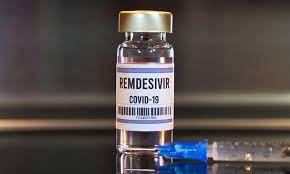A 2019 study of antiviral medications in the Democratic Republic of Congo, funded by the National Institute of Allergy and Infectious Diseases (NIAID), showed Gilead Sciences’ antiviral medication Remdesivir to have a 53% mortality rate. The study recommended against any further use of Remdesivir in any patients. Barely a year later, in April 2020, NIAID Director Anthony S. Fauci, MD declared Remdesivir “has a clear-cut significant positive effect in diminishing time to recovery” for patients with COVID-19 and that it would be “the standard of care,” in the United States as that it was 100% safe and effective. From then on, patients in the US would be fast-tracked towards this treatment exclusively, despite proven alternative treatments being available.
Remdesivir decreases a patient’s survival rate exponentially. The protocol is deadly, as it’s side effects lead to organ failure and death within weeks. Hospitals need sedate patients while withholding food and nutrition to keep patients from resisting treatment. Even the World Health Organization, since November 2020, has recommended against the use of Remdesivir in hospitalized patients because it found no evidence that Remdesivir improved survival and other outcomes, although it has revised its recommendation to limited used since April this year.
Why would a medication with a 53% mortality rate used on a disease with a 98% survival rate? Because in the United States, these treatments come with high monetary incentives. Hospital invoices for outpatient COVID-19 care average $3,200. Inpatient care drive invoices to an average of $111,000. If a hospital can intubate, sedate, and I.V. drip a patient the cost will explode to an average of $450,000. But the ultimate incentive comes from the Federal government: Medicare will give an additional 20% bonus on top of the whole hospital bill if Remdesivir is used, regardless of outcome, so a “keep & kill” protocol results in an additional $90,000 and a total of $540,000 per patient per hospital.
The US Food and Drug Administration (FDA) gave Remdesivir an Emergency Use Authorization (EUA) based on the premise that there was no other adequate treatment for COVID-19. Under an EUA, the FDA may allow the use of unapproved medical products in an emergency to treat or prevent serious or life-threatening diseases when there are no adequate alternatives. In fact, there was an alternative: of all the harmful misinformation spread over the past couple of years, one of the most disturbing false narratives was targeted at the Nobel Prize winning human medicine, Ivermectin. This inexpensive, off-license, extremely safe medication was proven effective at stopping the pandemic completely in other countries including Peru, India, Argentina, and Japan. But the FDA, the political left, and the media declared a war on this drug which has been safely used since 1987.
So, in the United States the Ivermectin treatment is unmentionable and doctor patient consultations have been cancelled. For this first time in US medical history, a patient is not given a choice of how they will be treated. There is no discussion of options. For COVID-19, only one prescribed protocol exists regardless of the patient or doctor experience, and this protocol comes with considerable financial incentive to ensure hospital compliance.
Regardless of the treatment that would be best for a patient, there should be informed consent. In the medical profession, that means a process that occurs with communication between a patient and physician which results in the patient’s authorization or agreement to undergo a specific medical intervention. This involves 4 components which are missing when the government mandates one solution for everyone: decision capacity, documentation of consent, disclosure, and competency. Informed consent to medical treatment is fundamental in both ethics and law. Patients have the right to receive information and ask questions about recommended treatments so that they can make well-considered decisions about care. Today, doctors are simply not having this conversation with patients.
That’s why two attorneys from separate law firms out of California are filing lawsuits against Clovis Community Medical Center, Saint Agnes Medical Center, and several doctors over the administering of what they referred to as the “Remdesivir Murder”, which is bringing fatal outcomes for patients. A patient’s legal right to informed consent is the only way to stop this protocol. The FDA and the drug companies have built an effective wall to protect themselves from any challenge. The media blocks sources of alternative information. But the legal right to a documented informed consent conversation between the doctor and the patient and the patient’s decision in the medical record cannot be denied. We can only hope that Michael Hamilton and Dan Watkins will prevail. The legal avenue may be the only way to stop the cabal of drug industry, federal government, and medical profession from forcing the worse possible outcome on its patients.




































